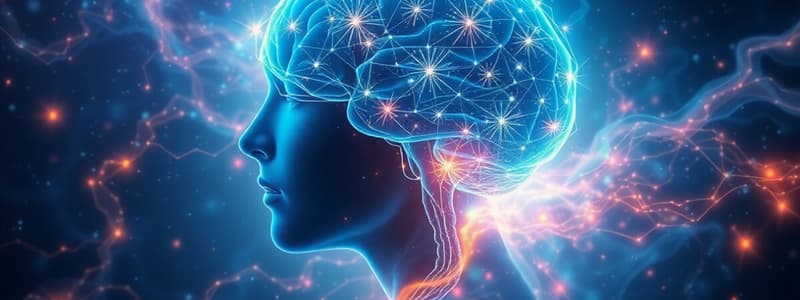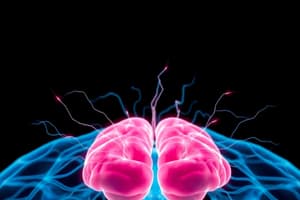Podcast
Questions and Answers
What is the definition of learning as discussed in the content?
What is the definition of learning as discussed in the content?
- A relatively permanent change in behavior resulting from experience (correct)
- An innate ability that does not require experience
- A process that does not involve any changes in the brain
- A temporary change in behavior resulting from experience
Which statement best describes neuroplasticity?
Which statement best describes neuroplasticity?
- It is the process involving structural and functional changes in the brain (correct)
- It refers only to changes in behavior without affecting brain structure
- It is an exclusive ability of the human brain
- It is the brain's ability to remain unchanged over time
Which of the following is NOT part of the sequence of events in learning?
Which of the following is NOT part of the sequence of events in learning?
- Synaptic pruning (correct)
- Gene expression
- Protein expression
- Neuronal activity
What might account for the long-term results of neuroplasticity?
What might account for the long-term results of neuroplasticity?
Which areas of the brain are particularly focused on when discussing memory representation?
Which areas of the brain are particularly focused on when discussing memory representation?
Which of the following statements about synapses is true?
Which of the following statements about synapses is true?
What will be included on the final exam as per the lecture?
What will be included on the final exam as per the lecture?
What is a possible outcome of intracellular signaling pathways during learning?
What is a possible outcome of intracellular signaling pathways during learning?
What is the potential benefit of post-training drug treatment according to the content?
What is the potential benefit of post-training drug treatment according to the content?
Which statement best describes the nature of aversive memories according to the content?
Which statement best describes the nature of aversive memories according to the content?
What role does adrenergic signaling play in memory storage?
What role does adrenergic signaling play in memory storage?
What effect does a β-adrenergic receptor blocker (propranolol) have during memory reactivation?
What effect does a β-adrenergic receptor blocker (propranolol) have during memory reactivation?
How might understanding memory processing lead to potential interventions for PTSD?
How might understanding memory processing lead to potential interventions for PTSD?
What did Lashley's studies suggest about the localization of memory?
What did Lashley's studies suggest about the localization of memory?
What type of memory was HM primarily impaired in following his surgery?
What type of memory was HM primarily impaired in following his surgery?
Which brain area is notably involved in memory function?
Which brain area is notably involved in memory function?
What is the primary role of the hippocampus in memory?
What is the primary role of the hippocampus in memory?
What does the Standard Memory Consolidation Theory propose about recent and remote memories?
What does the Standard Memory Consolidation Theory propose about recent and remote memories?
According to consolidation theory, what type of memories does the hippocampus primarily involve?
According to consolidation theory, what type of memories does the hippocampus primarily involve?
What did studies reveal about other patients with hippocampal damage aside from HM?
What did studies reveal about other patients with hippocampal damage aside from HM?
Which brain region is linked to recognition memory processes?
Which brain region is linked to recognition memory processes?
What is the key point of the Multiple Trace Theory proposed around 1997?
What is the key point of the Multiple Trace Theory proposed around 1997?
Which statement accurately reflects the role of the hippocampus over time?
Which statement accurately reflects the role of the hippocampus over time?
What factor complicates the Standard Memory Consolidation Theory regarding remote memories?
What factor complicates the Standard Memory Consolidation Theory regarding remote memories?
What is a key characteristic of neuroprosthesis in memory enhancement?
What is a key characteristic of neuroprosthesis in memory enhancement?
Which aspect of memory is primarily associated with the concept of 'knowing'?
Which aspect of memory is primarily associated with the concept of 'knowing'?
Which type of memory is primarily facilitated by the entorhinal cortex?
Which type of memory is primarily facilitated by the entorhinal cortex?
What type of memory does the hippocampus support according to multiple-trace theory?
What type of memory does the hippocampus support according to multiple-trace theory?
Which of the following does NOT describe a method of improving memory?
Which of the following does NOT describe a method of improving memory?
What factor is critical to determining which cells are included in an engram?
What factor is critical to determining which cells are included in an engram?
How does the 'winner take all' model relate to neuronal excitability?
How does the 'winner take all' model relate to neuronal excitability?
What is the role of CREB in the context of learning?
What is the role of CREB in the context of learning?
What happens to fear memories when CREB-overexpressing neurons are killed after training?
What happens to fear memories when CREB-overexpressing neurons are killed after training?
When two memories are acquired around the same time, what is likely to happen?
When two memories are acquired around the same time, what is likely to happen?
What implication arises from the fact that linked memories share the same cells?
What implication arises from the fact that linked memories share the same cells?
Which of the following best describes the outcome if gene expression is artificially increased through CREB?
Which of the following best describes the outcome if gene expression is artificially increased through CREB?
Which statement about transcription factors related to learning is true?
Which statement about transcription factors related to learning is true?
Flashcards are hidden until you start studying
Study Notes
Neural Basis of Learning
- Learning is a permanent change in behavior due to experience.
- The brain changes with experience (neuroplasticity).
- Neuroplasticity is widespread across the nervous system.
- Changes in synaptic strength are critical for learning.
- Neurons vary in excitability and plasticity.
- The time of an experience influences neuron excitability and plasticity.
- Highly excitable neurons are more likely to be involved in the engram.
- CREB (cyclic AMP-response element binding protein) is a transcription factor that regulates gene expression for learning.
- Increasing CREB expression increases neuron activity, while killing CREB-overexpressing neurons impairs memory.
- Memories acquired around the same time may involve similar neurons.
- Changing one linked memory may alter the other.
Neural Basis of Memory
- The hippocampus is crucial for memory acquisition.
- HM, a patient with removed hippocampus, experienced anterograde amnesia.
- Amnesia is the loss of memory.
- HM showed impairment in declarative (explicit) memory.
- Declarative memory involves “remembering” (episodic memory) and “knowing” (semantic memory).
- The standard consolidation theory (SCT) suggests the hippocampus is involved in recent memories, while remote memories reside in the cortex.
- The multiple-trace theory (MTT) proposes that each recall of an episodic memory creates a new hippocampal trace for it.
The Hippocampus is not Required for All Forms of Memory
- HM retained partial non-declarative memory, including procedural memory and implicit memory.
- Recognition memory is linked to the perirhinal cortex.
- The hippocampus is important for spatial memory.
- Different brain regions may be involved depending on the type and age of the memory.
Manipulating Memory
- Memories can be manipulated: erased or modified.
- Active memory, in use, can be altered through reconsolidation.
- The entorhinal cortex can be stimulated via electrodes to improve spatial memory.
- Neuroprostheses and non-invasive methods like TMS can enhance memory.
- Post-training drug treatments can modulate the effects of memory consolidation.
- Erasing a fear memory trace can be done through inducing and blocking reconsolidation with drugs.
- Blocking adrenergic signaling during memory reactivation may help treat PTSD.
- β-adrenergic receptor blockers, like propanolol, can reduce PTSD symptoms by affecting memory reactivation.
Studying That Suits You
Use AI to generate personalized quizzes and flashcards to suit your learning preferences.



